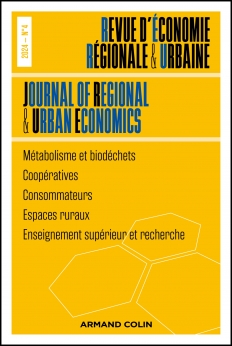
REVUE D'ÉCONOMIE RÉGIONALE ET URBAINE (4/2024)
Pour acheter ce numéro, contactez-nous
Recevez les numéros de l'année en cours et accédez à l'intégralité des articles en ligne.
L’évolution du rôle des établissements d’enseignement supérieur et de recherche (ESR) depuis les années 2000 interroge leur réel impact sur le développement économique régional français. Nous analysons dans quelles mesures les politiques de transfert de technologie en France, inspirées des politiques en matière de recherche publique américaines, sont bénéfiques à l’environnement économique local. Le nombre de brevets déposés entre 2000 et 2012 dans les départements français est utilisé comme un proxy de l’innovation locale. Nous montrons que les politiques de transfert de technologie comme le Bayh-Dole Act de 1980 aux États-Unis ou la loi de 2002 en Allemagne ne sont pas des instruments suffisants pour favoriser l’innovation locale à partir de la recherche effectuée au sein des établissements de l’ESR.
In the second half of the twentieth century, higher education institutions (ESR) were assigned “the third mission” with the expectation that they generate knowledge outside academic environments to the benefit of the social, cultural and economic development, especially in their local scope. Starting with the United States, governments in multiple countries have promoted technology transfer policies to foster the innovation induced by public research from the ESR (Bayh-Dole Act of 1980). Inspired by those reforms, France has introduced new reforms since the 2000s to change the role of the ESR establishments. It calls for a closer scrutiny of their real impact on local economic development. With this paper, we propose to fill a gap in the literature by analyzing how ESR research can foster local innovation in the French context. We select the laws « Research Schedule » (LPR) and « University Freedom and Responsibility » (LRU) of 2006 and 2007 as pivotal higher education reforms. We seek to determine whether these policies are beneficial to the local economic environment or not. The number of patents filed between 2000 and 2012 in French departments is used as a proxy for local innovation. Despite greater research capacity in the years following the implementations of those reforms, we demonstrate that technology transfer policies are not sufficient instruments to foster local innovation based on research carried out within ESR establishments. These results are similar to those obtained in the United States and Germany.

